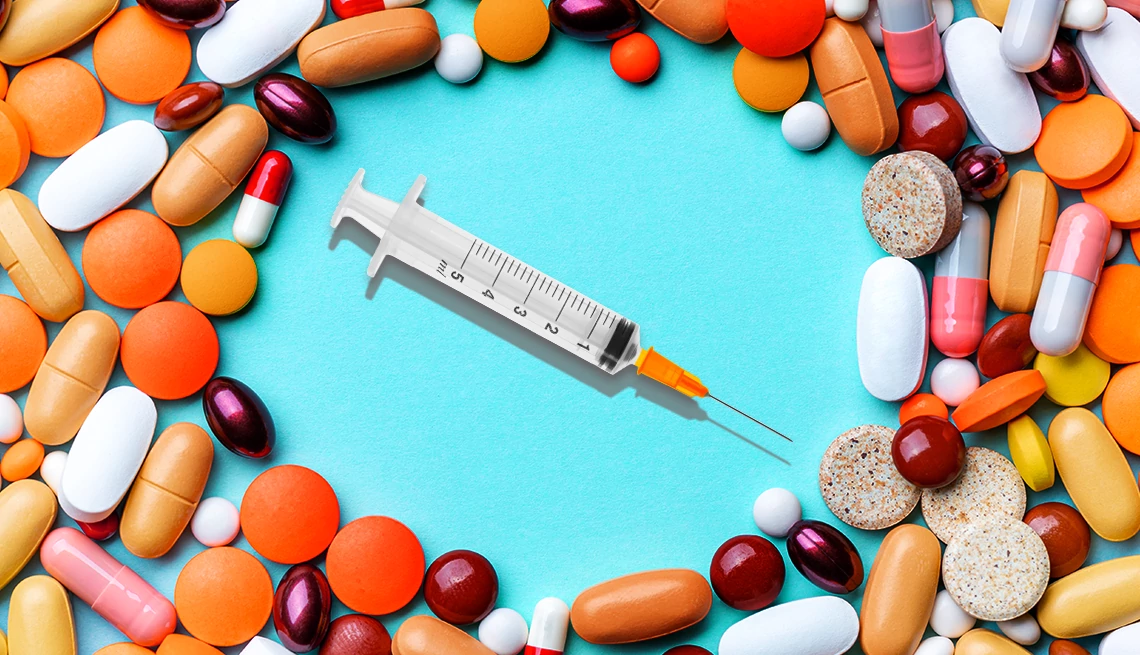
Medications that interact with the flu shot
- Select a language for the TTS:
- UK English Female
- UK English Male
- US English Female
- US English Male
- Australian Female
- Australian Male
- Language selected: (auto detect) - EN
Play all audios:

“When getting an injected steroid in a joint or epidural space, you get some systemic absorption of the medication, which causes a transient dampening of your immune system,” says William
Raoofi, M.D., of the Center for Interventional Pain Medicine at Mercy Medical Center in Baltimore, Maryland, “Then when you are vaccinated and exposed to the weakened flu virus, your immune
system is not as good at responding to it.” When suppressed, your immune system does not effectively recognize the inactive flu virus introduced by the vaccine. Then your immune system could
fail to launch a strong attack on the live virus if you are exposed later. Raoofi adds that as you age, your body produces fewer and weaker immune cells that cannot remember the virus you
were vaccinated against. Steroids can further weaken your ability to launch a strong immune response to protect yourself if you are exposed to the flu later. When an older adult comes into
his office for a steroid injection and has received or plans to receive the flu vaccine within the next two weeks, Raoofi says he reschedules the appointment for two weeks after the
vaccine. “It is a risk-benefit decision,” he says. Due to the high risk of death or complications for an older person with the flu, Raoofi says that it is important to leave a two-week
window for the immune system to ramp up its response to the flu virus before receiving the steroid injection. 2. ORAL PREDNISONE Prednisone is a steroid that is taken orally to decrease
inflammation, suppress an overactive immune system or replace cortisol. It treats conditions like asthma, arthritis and inflammatory bowel disease. Prednisone, combined with medications like
cyclosporine, also suppresses the immune system after organ transplantation to prevent rejection. At doses of 20 mg per day for two weeks or more, prednisone can decrease your body’s
ability to form antibodies, weakening your immune response to the flu vaccine. “High doses of steroids can weaken your immune system and potentially reduce the effectiveness of the flu
vaccine," Pepin says. 3. NON-STEROIDAL ANTI-INFLAMMATORY DRUGS (NSAIDS), ACETAMINOPHEN AND ASPIRIN Over-the-counter pain relievers and fever reducers, taken before or after a flu
vaccination, may also decrease your response to the vaccine. These medications include acetaminophen (Tylenol), aspirin and non-steroidal anti-inflammatory drugs (NSAIDS) like ibuprofen
(Motrin, Advil) and naproxen (Aleve). ALCOHOL AND THE FLU SHOT The National Institute on Alcohol Abuse and Alcoholism has found that if you drink a lot (5 drinks in a day for men and 4
drinks in a day for women) in one sitting, the alcohol slows your immune response for up to 24 hours. Drinking 24 hours before or after a flu vaccine can hinder your body’s ability to react
to the vaccine and build immunity. Pepin recommends abstaining from drinking before you get the flu vaccine and for two weeks after being vaccinated to allow your immune system time to
launch a full response. “When you get the flu vaccine, a lot of people will get a temperature of 99 degrees, malaise and pain at the injection site for up to 24 hours,” says Pepin. “This
means your immune system is responding to the flu virus.” According to Pepin, taking acetaminophen or ibuprofen to prevent or reduce your temperature can reduce your ability to ramp up your
immune response. If you are uncomfortable after the flu vaccine, Pepin recommends taking acetaminophen (Tylenol) which does not have an anti-inflammatory effect like NSAIDs and aspirin.
However, she does not recommend taking acetaminophen until six hours after the vaccine to give your body time to start its immune response.
